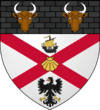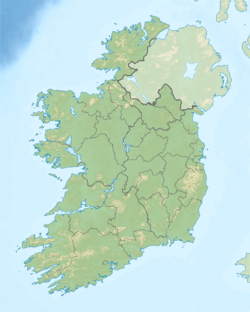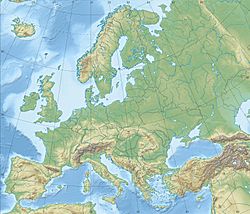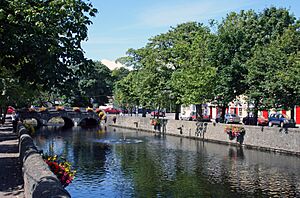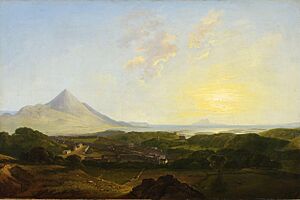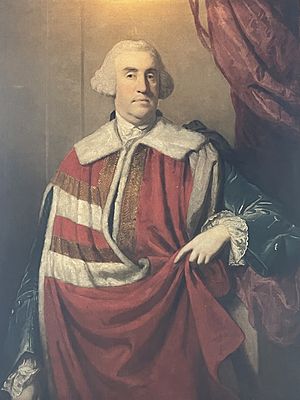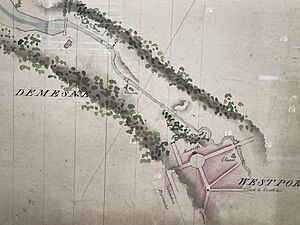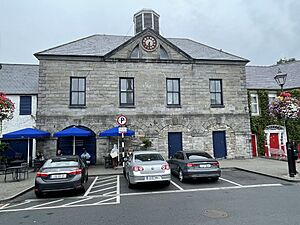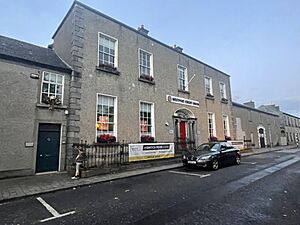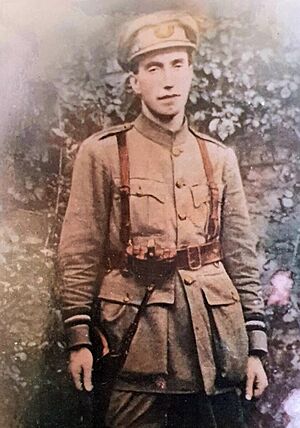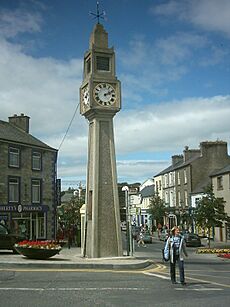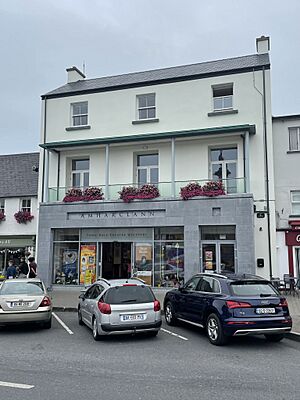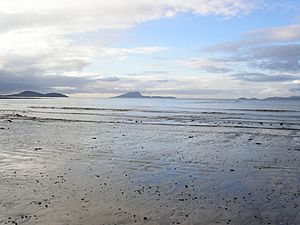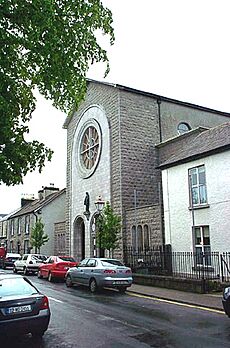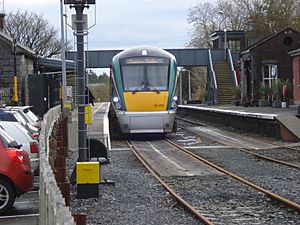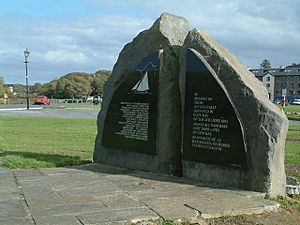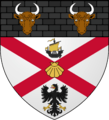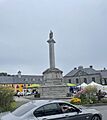Westport, County Mayo facts for kids
Quick facts for kids
Westport
Cathair na Mart (Irish)
|
||
|---|---|---|
|
Town
|
||
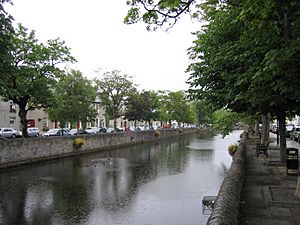
Mall along Carrowbeg River in Westport
|
||
|
||
| Country | Ireland | |
| Province | Connacht | |
| County | ||
| Elevation | 80 m (260 ft) | |
| Population
(2022)
|
||
| • Urban | 6,872 | |
| Time zone | UTC±0 (WET) | |
| • Summer (DST) | UTC+1 (IST) | |
| Eircode routing key |
F28
|
|
| Telephone area code | +353(0)98 | |
| Irish Grid Reference | M004841 | |
Westport (called Cathair na Mart in Irish, meaning "the stone fort of the beeves") is a beautiful town in County Mayo, Ireland. It sits at the south-east corner of Clew Bay, which is an inlet of the Atlantic Ocean on Ireland's west coast. Westport is a very popular place for tourists and is known for its high quality of life. It has won the Irish Tidy Towns Competition three times (in 2001, 2006, and 2008). In 2012, it was named the "Best Place to Live in Ireland" by The Irish Times newspaper.
Westport is special because it's one of the few "planned towns" in Ireland. This means its town centre was carefully designed in the Georgian style. The Carrowbeg River flows through the town, with lovely tree-lined paths called The Mall and several stone bridges.
The famous pilgrimage mountain, Croagh Patrick, often called "the Reek," is about 10 kilometers west of Westport. It creates a stunning backdrop for the town.
Contents
History of Westport
What's in a Name?
Westport gets its name from an old 16th-century castle called Cathair na Mart. This castle and the area around it belonged to the powerful seafaring Ó Máille family. They controlled the Clew Bay area, which was then known as Umaill.
How Westport Grew
The original village of Cathair na Mart was located near what is now the front lawn of Westport House. It was a small village with about 700 people and a little port. In 1752, John Browne, 1st Earl of Altamont, decided to move the village. He wanted to create beautiful parklands around his home, Westport House.
The first clear sign of the new town being built was an advertisement in 1767. It said that a "New Town" would be built near old Westport, with a market house and many new homes. The architect William Leeson helped with the plans. Westport is special because it's one of the few planned towns in Ireland.
The town's design uses ideas from medieval town planning. A key feature is how the Carrowbeg River is part of the design. Low stone walls line the river, creating tree-lined paths called The Mall. These paths were built after 1800.
Many people thought that the famous architect James Wyatt designed Westport. However, he only worked on parts of Westport House from 1778, after the town's main design was already well underway. Westport House itself was first built by Richard Cassels in the 1730s.

Times of Change
After the Easter Rising in 1916, many people in Westport who supported Irish independence were arrested. They were sent to a camp in Wales. During the Irish War of Independence (1919-1921), there was conflict in Westport. In 1919, a local official was killed. In 1921, after a police officer was killed, police forces destroyed homes and businesses of people linked to the Irish Republican Army (IRA). After the Anglo-Irish Treaty, the police left their barracks in Westport in February 1922.
The Civil War Period
During the Irish Civil War, Westport was controlled by the Anti-Treaty side. In July 1922, the new National Army arrived in Clew Bay by ship. They landed troops and an armored car at Westport Quay. The Republicans then left the town.
Modern Westport
Since the late 1900s, Westport has grown a lot. Many new housing areas have been built around the town.
Westport House
Westport House was first built by Colonel John Browne and his wife Maude Bourke. Maude was a descendant of the famous pirate queen Grace O'Malley. In the past, the sea tide used to reach the walls of the house. The house and its beautiful parklands were designed by architects like Richard Cassels, Thomas Ivory, and James Wyatt. It has a lake, gardens, and amazing views of Clew Bay, the Atlantic Ocean, and Croagh Patrick. In 2017, a local family bought Westport House and its grounds.
Economy
Westport is home to some important companies. AbbVie, a global biopharmaceutical company, employs 1,400 people in the town. Portwest, a worldwide clothing manufacturing company, also started in Westport in 1904 and is still based there.
Population
| Historical population | ||
|---|---|---|
| Year | Pop. | ±% |
| 1821 | 4,326 | — |
| 1831 | 4,448 | +2.8% |
| 1841 | 4,365 | −1.9% |
| 1851 | 4,114 | −5.8% |
| 1861 | 3,819 | −7.2% |
| 1871 | 4,417 | +15.7% |
| 1881 | 4,469 | +1.2% |
| 1891 | 4,070 | −8.9% |
| 1901 | 3,892 | −4.4% |
| 1911 | 3,674 | −5.6% |
| 1926 | 3,488 | −5.1% |
| 1936 | 3,409 | −2.3% |
| 1946 | 3,240 | −5.0% |
| 1951 | 3,104 | −4.2% |
| 1956 | 2,947 | −5.1% |
| 1961 | 2,882 | −2.2% |
| 1966 | 2,927 | +1.6% |
| 1971 | 3,023 | +3.3% |
| 1981 | 3,378 | +11.7% |
| 1986 | 3,456 | +2.3% |
| 1991 | 3,688 | +6.7% |
| 1996 | 4,520 | +22.6% |
| 2002 | 5,634 | +24.6% |
| 2006 | 5,475 | −2.8% |
| 2011 | 5,543 | +1.2% |
| 2016 | 6,198 | +11.8% |
| 2022 | 6,872 | +10.9% |
Westport's population has been growing. Between 2011 and 2016, the number of people living in the town increased from 5,543 to 6,198. By 2022, the population was 6,872.
Culture
People from Westport are traditionally called "Coveys." In the past, they even had their own special way of speaking, called the Covey dialect, which was hard for outsiders to understand. For example, they used to call a woman a "doner."
Matt Molloy, a famous musician from the band the Chieftains, owns a pub and music venue on Bridge Street.
The Westport Town Hall Theatre on the Octagon is another fun place. It was built in the early 1900s and was updated in 2015. The theatre hosts many events, including concerts, local plays, and puppet shows for kids. The Custom House Studios and Gallery is a hub for local art.
Media
Newspapers
Westport has its own local newspaper, The Mayo News, which started in 1892. Other newspapers available include the Mayo Advertiser, Western People, and the Connaught Telegraph.
Radio
Westport has a local radio station called Westport Radio 98.2 FM.
Tourism
Westport is the top tourist spot in County Mayo. Visitors come from all over the world and Ireland to see it. In 1842, the English writer William Makepeace Thackeray visited Westport. He said it was "The most beautiful view I ever saw in the world." He wondered why more English travelers didn't come to see it in Ireland.
People visit Westport for its beautiful scenery, its pubs and restaurants, its blue flag beaches, and to climb Croagh Patrick. Because it's close to Connemara, Achill, Clew Bay, and Croagh Patrick, Westport is a great base for exploring the region. Westport House and its Pirate Adventure Park are popular with families. Westport also has an 18-hole golf course. In 2008, Westport became the first town to be fully shown in 3D on Google Earth.
Festivals and Events
Westport hosts several festivals and events each year. These include the Westival (a music and arts festival in October), a Croagh Patrick walking festival in March, a sea angling festival in June, and The Saltwater Festival (for music, food, art, and culture) in May.
Religion

There are several churches in Westport: St Mary's (Catholic), Holy Trinity (Anglican), Elim Pentecostal Church, Amazing Grace Fellowship, and Calvary Church Westport (Evangelical).
The foundation stone for the first Catholic chapel was laid in 1813. The current St Mary's church was built between 1957 and 1961. The old Church of Ireland parish church was built in 1797. Its ruins can still be seen today. The current Holy Trinity church was consecrated in 1872. It was designed in the neo-Gothic style.
Religious Orders
Two main religious groups have been important in Westport's history: the Congregation of Christian Brothers and the Sisters of Mercy. The first Sisters of Mercy arrived in Westport in 1842. They received a site for their convent in 1842, and the new convent was built in 1843. The Christian Brothers came to Westport in 1865. They taught at the Castlebar Street School and later moved to a new residence on Newport Road. They left Westport in 2002.
Education
Westport has two secondary schools, five primary schools, and the Westport College of Further Education, which opened in 2009. The secondary schools are Rice College (for boys) and Sacred Heart School (for girls). In 2006, two primary schools, Scoil Phadraig na mBráithre and Saint Patrick's Mercy National School, joined together to form Scoil Phádraig. It is the largest primary school in Westport. Gaelscoil na Cruaiche is an all-Irish Catholic Primary School that opened in 1995. Holy Trinity National School is a co-educational primary school. The Quay School, also known as Saint Columbkille's Primary School, is located at Westport Quay. A new primary school, Westport Educate Together, opened in 2019.
History of Education
For many years, the Christian Brothers were very involved in education for boys in Westport. They had schools on Castlebar Street and later on Newport Road. In 1987, the secondary school Rice College was built to meet the growing need for education.
Transport
Rail Travel
Westport is the end of a 250-kilometer railway line from Dublin Heuston in Dublin. This railway connects Westport to Castlebar. Westport railway station opened in 1866. There used to be a line that went all the way to Westport Quay, but it was removed in 1977. Part of this old railway line is now a public walkway.
Bicycle Paths
The Great Western Greenway is a special path for bikes and walkers. It follows the route of an old railway line that used to go to Achill Island, passing through Newport and Mulranny.
Roads
The N5 national primary route connects Westport to Castlebar and then to the N4, which leads to Dublin. The N59 national secondary route also passes through Westport.
Air Travel
The closest regional airport is Ireland West Airport, about 60 kilometers away.
Westport Quay (Port)
Westport has a small port called the Quay. It used to be very busy with commercial ships, but it's not used for that anymore. In 1894, a sad event called the Clew Bay Drowning happened here. The Quay is located a bit away from the deep waters of Clew Bay. This was a good thing in the past, as it helped protect the town from pirates. Today, the Quay area has old warehouses that have been turned into new buildings, along with restaurants and pubs. The Clew Bay Heritage Centre, a small museum about Westport's history, is also located here.
Sports and Activities
Westport is a great place for sports and adventure! The town has Gaelic football, soccer, and rugby clubs that compete in local and national events. Fáilte Ireland, the Irish tourism board, has even named Westport a top spot for adventure sports. Every August, Westport hosts Gael Force West, one of the biggest one-day adventure races in the world. You can also enjoy horse riding, surfing, sea kayaking, windsurfing, and sailing here.
Fishing
Westport is a popular spot for fishing. You can go sea fishing in Clew Bay or try game and coarse fishing in nearby lakes and rivers. Clew Bay is known for sea angling competitions and is a good place to catch large fish like common skate, tope, huss, and ray.
Gaelic Games
The Westport GAA club, CLG Chathair na Mart, has a long history. Gaelic football is the main sport played at the club.
Golf
Westport Golf Club is a championship course. In 2009, Golf Digest ranked it 43rd among the top 100 golf courses in Ireland. It has hosted many important tournaments.
Soccer
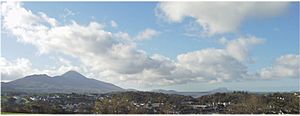
Westport United football (soccer) club was started in 1911. They won the FAI Junior Cup in 2005 and play their home games at United Park. Their club colors are red and black.
Rugby
Westport Rugby Club is located just outside the town. They have won league and cup championships in recent years.
Basketball
Westport Warriors Basketball Club has teams for all age groups and plays in the MABB League.
Famous People from Westport
- Cornelius Coughlan (1828–1915), a brave Irish soldier who received the Victoria Cross.
- George A. Birmingham (1865–1950), a writer who was also a rector (church leader) in Westport.
- John MacBride (1868–1916), born in Westport, he was involved in the Easter Rising and is remembered with a monument. He was the father of Nobel Peace Prize winner Seán MacBride.
- Joseph Maher (1933–1998), an actor.
- Séamus Hughes (born 1952), a politician who served as a Teachta Dála (TD), which is a member of the Irish parliament.
- Michael Ring (born 1953), also a politician and Teachta Dála (TD).
- Lee Keegan (born 1989), a famous Gaelic football player.
- Conor O'Malley (born 1994), a footballer.
International Connections
Westport has special connections with other towns around the world:
- It is twinned with Plougastel-Daoulas in Brittany, France.
- It is also twinned with Limavady, County Londonderry, Northern Ireland. This connection started in the 1980s and became official in 2002.
- Since 1982, Westport has had a partnership with the town of Aror, Kenya. The people of Westport have helped improve things like buildings and services in Aror.
Images for kids
-
The Octagon Monument first honored George Clendining in 1845. Today, it features a statue of Saint Patrick by Ken Thompson, put up in 1990.
-
Holy Trinity Anglican Church was designed by Sir Thomas Newenham Deane.
-
Panoramic view of Westport from the Castlebar side, showing Croagh Patrick (left) and Clare Island (right).
See also
 In Spanish: Westport (Mayo) para niños
In Spanish: Westport (Mayo) para niños


